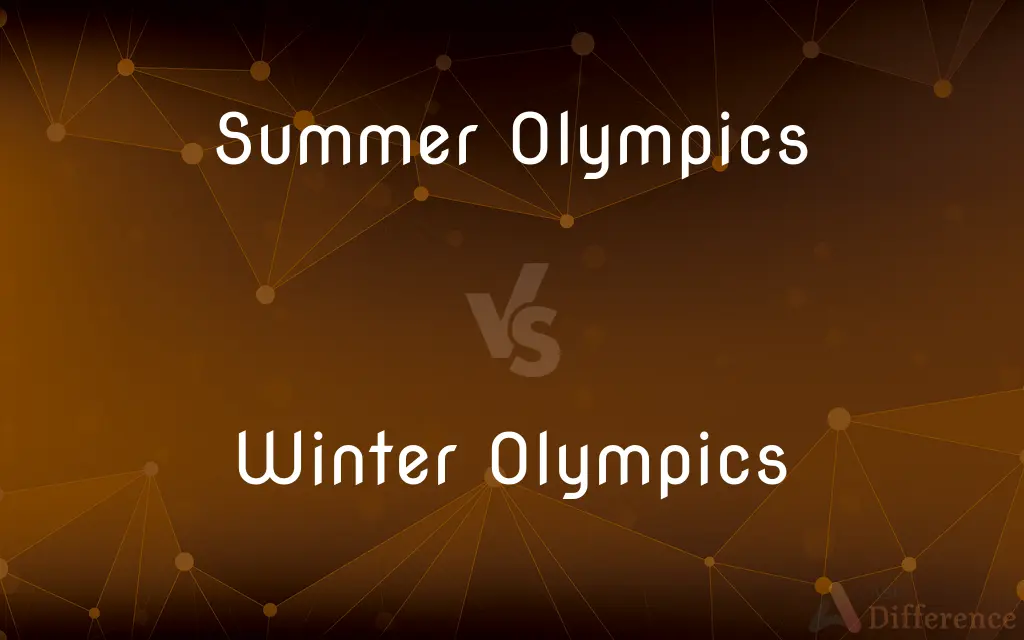Summer Olympics vs. Winter Olympics — What's the Difference?
Edited by Tayyaba Rehman — By Fiza Rafique — Published on December 17, 2023
The Summer Olympics host warm-weather sports, whereas the Winter Olympics focus on ice and snow events.

Difference Between Summer Olympics and Winter Olympics
Table of Contents
ADVERTISEMENT
Key Differences
The Summer Olympics is an international multi-sport event that takes place every four years, drawing participants from countries worldwide. This grand event showcases a vast array of sports, most of which are played outdoors and benefit from warmer climates. From athletics to swimming, the competitions in the Summer Olympics require conditions suitable for those sports. In contrast, the Winter Olympics, also held quadrennially, is devoted exclusively to sports played on snow and ice.
Diving into history, the Summer Olympics, originating in Ancient Greece, have been a longstanding tradition, with the modern games starting in 1896. The Winter Olympics, however, began much later, in 1924, recognizing the global passion for winter sports. Both the Summer Olympics and Winter Olympics aim to foster international unity and celebrate athletic prowess, but they cater to distinct sports and seasons.
One can witness sports like basketball, volleyball, and gymnastics at the Summer Olympics. These sports, often played on courts or fields, are tailored for warmer months. The Winter Olympics, on the other hand, proudly features sports like skiing, bobsleigh, and figure skating. These winter-centric sports necessitate cold climates and, often, icy surfaces.
In terms of frequency, both the Summer Olympics and Winter Olympics happen every four years. However, they don't overlap; the Winter Olympics occurs two years after the Summer Olympics, ensuring Olympic enthusiasts have a major event to anticipate every two years.
Comparison Chart
Sports Environment
Warm-weather sports; often outdoors.
Cold-weather sports; on ice and snow.
ADVERTISEMENT
Origin
Ancient Greece with modern games in 1896.
Started in 1924.
Sample Sports
Basketball, volleyball, athletics.
Skiing, bobsleigh, figure skating.
Frequency
Every four years.
Every four years, two years after Summer Olympics.
Typical Venues
Fields, courts, pools.
Snow tracks, ice rinks.
Compare with Definitions
Summer Olympics
A quadrennial event featuring warm-weather sports.
The 2020 Summer Olympics were held in Tokyo.
Winter Olympics
An international festivity of snowy sportsmanship.
The Winter Olympics includes both speed skating and curling competitions.
Summer Olympics
An event fostering international unity through sports.
The Summer Olympics often introduces new sports to global audiences.
Winter Olympics
A quadrennial competition showcasing ice and snow sports.
The 2022 Winter Olympics took place in Beijing.
Summer Olympics
The world's foremost sports festival in sunny conditions.
The Summer Olympics' opening ceremony is a spectacle of culture and unity.
Winter Olympics
The major sports gathering in the world's coldest climates.
Ski jumping at the Winter Olympics always draws large audiences.
Summer Olympics
The primary global sports competition held in summer.
Athletes train for years to qualify for the Summer Olympics.
Winter Olympics
The pinnacle of winter sports held every four years.
Figure skating is a beloved event at the Winter Olympics.
Summer Olympics
A celebration of diverse athletic disciplines in warmth.
Track and field events are a highlight of the Summer Olympics.
Winter Olympics
A global event celebrating winter athletic expertise.
Athletes face extreme cold conditions during the Winter Olympics.
Common Curiosities
What types of sports are in the Winter Olympics?
The Winter Olympics feature snow and ice sports like skiing and bobsleigh.
Which Olympics has more sports, Summer or Winter?
The Summer Olympics has more sports compared to the Winter Olympics.
How often are the Summer Olympics held?
The Summer Olympics are held every four years.
Do both Olympics have opening and closing ceremonies?
Yes, both the Summer Olympics and Winter Olympics have grand opening and closing ceremonies.
When did the modern Summer Olympics start?
The modern Summer Olympics started in 1896.
Are the Winter Olympics younger than the Summer Olympics?
Yes, the Winter Olympics began in 1924, much later than the Summer Olympics.
Do both Olympics occur in the same year?
No, the Winter Olympics happens two years after the Summer Olympics.
Which Olympics has the marathon event?
The marathon is an event in the Summer Olympics.
In which city were the 2020 Summer Olympics held?
The 2020 Summer Olympics were held in Tokyo.
How do the venues differ between the two Olympics?
Summer Olympics use fields, courts, and pools, while Winter Olympics need snow tracks and ice rinks.
Is figure skating part of the Summer Olympics?
No, figure skating is a Winter Olympics sport.
Are new sports added to the Olympics?
Yes, both the Summer Olympics and Winter Olympics periodically introduce new sports.
What's a popular team sport in the Winter Olympics?
Ice hockey is a popular team sport in the Winter Olympics.
Can a city host both Summer and Winter Olympics?
Yes, but it's rare; a city would need suitable venues for both types of sports.
Which Olympics has more participating countries, Summer or Winter?
The Summer Olympics typically sees participation from more countries than the Winter Olympics.
Share Your Discovery

Previous Comparison
Si Engine vs. Ci Engine
Next Comparison
EPSP vs. IPSPAuthor Spotlight
Written by
Fiza RafiqueFiza Rafique is a skilled content writer at AskDifference.com, where she meticulously refines and enhances written pieces. Drawing from her vast editorial expertise, Fiza ensures clarity, accuracy, and precision in every article. Passionate about language, she continually seeks to elevate the quality of content for readers worldwide.
Edited by
Tayyaba RehmanTayyaba Rehman is a distinguished writer, currently serving as a primary contributor to askdifference.com. As a researcher in semantics and etymology, Tayyaba's passion for the complexity of languages and their distinctions has found a perfect home on the platform. Tayyaba delves into the intricacies of language, distinguishing between commonly confused words and phrases, thereby providing clarity for readers worldwide.













































